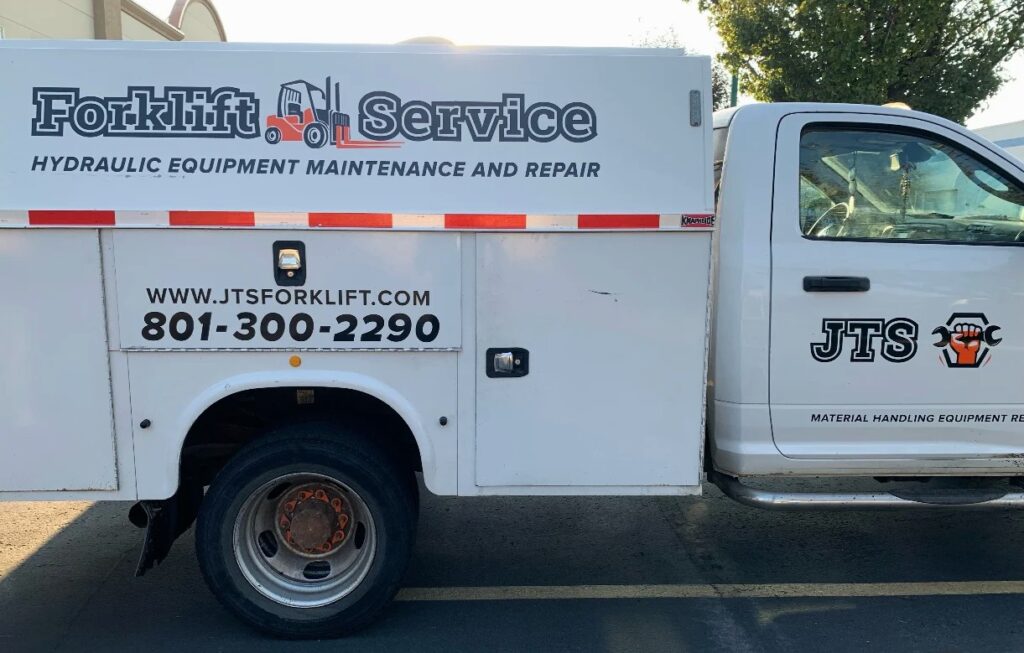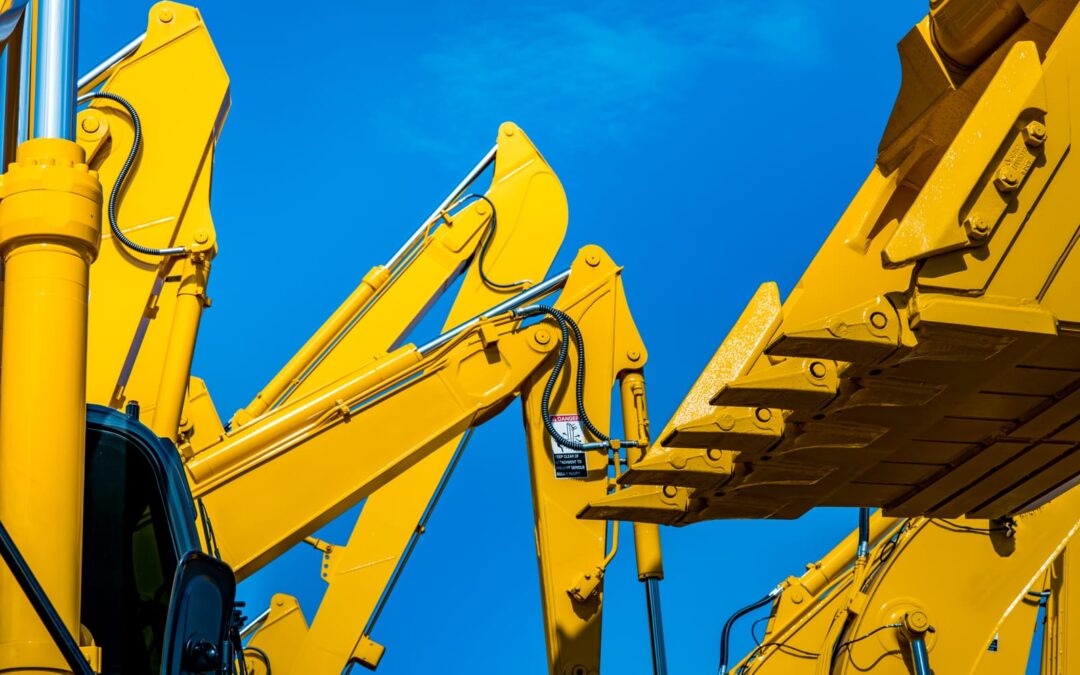Your heavy equipment is the engine of your business. When machinery like excavators, dump trucks, or cranes is running efficiently, so is your operation. The hydraulic system is the heart of this equipment, providing the power needed for lifting, digging, and hauling. But when it fails, it can bring your entire project to a halt. Understanding common hydraulic system failures is the first step toward preventing costly downtime and identifying the need for hydraulic system repair.
At JTS Forklift Service, we know that material handling equipment is the backbone of your Utah business. Our expertise in heavy equipment maintenance ensures your machinery stays in peak condition. This guide will walk you through common hydraulic issues and the preventive measures that keep your operations running smoothly.
Common Hydraulic System Failures
Hydraulic systems are powerful, but they are not invincible. Several common issues can lead to significant damage and expensive repairs if not addressed promptly.
Contamination
Contamination is the leading cause of hydraulic system failure. When dirt, debris, or water enters the hydraulic fluid, it acts like sandpaper inside your system. This abrasive material wears down sensitive components, clogs filters, and degrades the quality of the fluid. Contamination can lead to sluggish performance, increased friction, and eventually, catastrophic failure of pumps and valves.
Overheating
Hydraulic systems generate a lot of heat. When the hydraulic fluid gets too hot, it loses its ability to lubricate properly. This leads to accelerated wear on components. Overheating can be caused by a variety of factors, including low fluid levels, clogged coolers, or operating the equipment beyond its intended capacity. The effects include damaged seals, reduced component lifespan, and a loss of system efficiency.
Leaks
Leaks are one of the most visible signs of a hydraulic problem. They can occur internally or externally.
- External leaks are easy to spot and can result in significant fluid loss, creating safety and environmental hazards.
- Internal leaks are less obvious but can be just as damaging. They cause a loss of pressure, leading to poor performance and overheating as the system works harder to compensate.
Cavitation
Cavitation occurs when there isn’t enough fluid being supplied to the hydraulic pump. This creates vapor-filled cavities, or bubbles, in the fluid. When these bubbles collapse under pressure, they create a powerful shockwave that can erode and damage internal pump components. You may hear a high-pitched whining or rattling sound, which is a clear indication that your system requires immediate attention.
Component Wear
Over time, the components of your hydraulic system will naturally wear out. Pumps, valves, and cylinders are constantly in motion and under immense pressure. Regular wear and tear can lead to reduced performance, internal leaks, and eventual failure. Without routine inspections, this gradual decline can go unnoticed until a major breakdown occurs.
How to Prevent Hydraulic System Failures
Preventive maintenance is the key to avoiding unexpected breakdowns and extending the life of your equipment. A proactive approach saves you time, money, and stress.
Regular Inspections
Routine checks by qualified technicians are your first line of defense. A professional can spot early warning signs that you might miss. At JTS Forklift Service, our comprehensive inspections ensure every component functions safely and efficiently. We identify potential issues before they become costly problems.
Fluid Maintenance
Using the correct hydraulic fluid and changing it regularly is crucial.
- Check Fluid Levels: Always maintain proper fluid levels to prevent overheating and cavitation.
- Use the Right Fluid: Ensure you’re using the fluid type recommended by the manufacturer.
- Regular Changes: Old or degraded fluid loses its protective qualities. Stick to a schedule for fluid replacement to keep your system lubricated and clean.
Filter Maintenance
Hydraulic filters are designed to capture contaminants before they can cause damage. Over time, these filters become clogged and less effective. Regularly replacing filters is a simple and cost-effective way to prevent contamination and protect your system’s delicate components.
Temperature Control
Maintaining an optimal operating temperature is essential for hydraulic health.
- Ensure the system’s coolers are clean and free of debris.
- Check fluid levels frequently.
- Avoid pushing your equipment beyond its design limits for extended periods.
Component Checks
During routine inspections, pay close attention to the system’s core components. Inspect hoses, seals, and cylinders for signs of wear. Listen for unusual noises from the pump, as these can indicate problems such as cavitation or aeration. Early detection enables timely hydraulic system repair before a minor issue becomes a major failure.
The Role of Professional Maintenance
While daily checks are helpful, nothing replaces the expertise of a professional maintenance service. Companies like JTS Forklift Service possess the specialized tools and expertise to perform in-depth diagnostics and expert hydraulic system repairs.
Hiring experts minimizes downtime and maximizes productivity. Our scheduled maintenance programs are designed to ensure the long-term reliability and safety of your equipment. We create a plan tailored to your machinery’s needs, helping you avoid unexpected breakdowns and expensive emergency repairs.

JTS Forklift Service Has You Covered
At JTS Forklift Service, we provide a comprehensive range of services to keep your heavy equipment running smoothly. Our team is available 24/7 for emergency repairs throughout the state of Utah. We service all makes and models, and our specialization in electric forklifts means we have the in-depth knowledge to handle any challenge. From routine fluid checks to complete component rebuilds for excavators and cranes, we have the parts and expertise to get the job done right. Our commitment is to provide prompt, reliable service that keeps your operation running smoothly.
Protect Your Investment with JTS Forklift Service
Preventative heavy equipment maintenance is not an expense—it’s an investment in the longevity and reliability of your machinery. By understanding common hydraulic system failures and taking proactive steps to prevent them, you can avoid costly downtime and keep your projects on track. Don’t wait for a breakdown to disrupt your business.
Contact JTS Forklift Service today on our website at www.jtsforklift.com/contact-us/ or call us directly at (801) 300-2290 for immediate repairs and to set up a preventive maintenance plan. Let us help you keep your equipment operating at its best.
GET IN TOUCH WITH US TODAY
